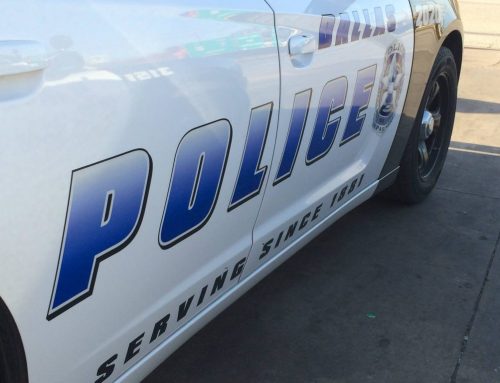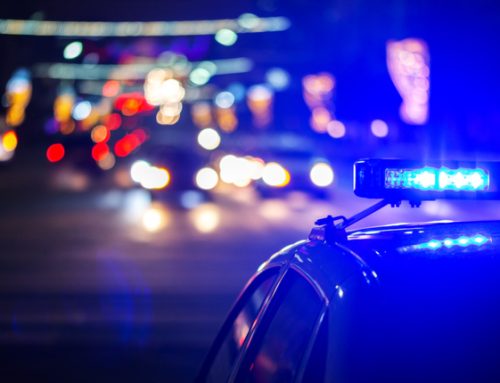Each month, the Advocate visits with Sgt. Jim Little, Sr. Cpl. Rick Janich and Officers T.X. “Tri” Ngo and Wes Stout, who are stationed in one of the Dallas Police Department’s storefronts (670-5514). The storefronts are best known for bicycle-patrol officers. During upcoming months, the officers will discuss law enforcement topics related to everyday life in Dallas. (Little did not attend this month’s lunch, which was held at Matt’s Rancho Martinez restaurant in Lakewood.)
Advocate: What would you guys like to talk about today?
Rick: We’ve been promising to talk about what to do when you’re involved in an automobile accident, so let’s do that. It just so happens that I’ve got some statistics regarding accidents that you might find interesting.
For example, did you know that as of April 15, there have been 7,410 automobile accidents in the city? Or that about half (3,685) involved an injury? That’s an average of 62 accidents per day here in Dallas. And these area only the accidents that have been reported to police – who knows how many others have occurred?
Advocate: That brings up an interesting point: When do you report an accident to the police, and when do you just settle up with the other driver on your own?
Rick: The first thing to do is check to see if anyone is injured in the accident. If someone is injured…
Tri: Then you have a major accident, and you should call 911. Always.
Rick: If there are no injuries, you should immediately move the vehicles off the road to a safe place. That’s probably the biggest problem we have – people think they have to leave the vehicles exactly where the accident occurred. If the vehicles are drivable, move them off the road and exchange information – if there are no injuries.
If it’s a minor accident (no injuries), get the other driver’s license number, insurance information and a contact telephone number. Then just drive away and turn it over to the insurance company. You don’t need to call the police about that, and actually, you shouldn’t because we can’t do anything about it anyway.
Now, if the cars aren’t drivable, you need to call 911 and have the police come out and call the wrecker. If the police come out, according to city ordinance, then only a city-contracted wrecker can be called if the accident occurred on a public street.
Tri: The reason for that is that we (police) don’t have to wait for a private contractor to show up. The public contractor usually gets there faster, so it saves us time.
Rick: The city ordinance is designed to keep wreckers from just driving around the city, looking for wrecks, and then overcharging the victims.
Tri: The ordinance keeps the price fixed, too. I think it’s $45 for a tow anywhere within the city limits.
Rick: The city contractors are required to arrive within 30 minutes.
Advocate: If you call the public wrecker contractor, does he have to take your car to the city pound?
Tri: You have to have cash for a City contract wrecker. If you don’t have cash, even if you don’t want to be taken to the pound, they’ll still take you to the pound.
Rick: Some auto body shops, if you call ahead or if you have a good relationship with them, they may agree to pay the wrecker and just add the charge onto your bill.
Advocate: If you guys are sitting at a stop light and see an accident occur, but you know the vehicles are drivable, do you have to stop and write up the accident?
Rick: Most officers, unless they’re en route to a call, will stop to see whether anyone is hurt and direct the people to safety.
Advocate: Now, suppose that a car causes damage to property other than another vehicle. For example, a car recently drove over y lawn and scraped up a cement stair in front of my house. Is it appropriate to call the police then?
Rick: Reckless damage is an offense report, not an accident report.
Tri: For that, it would probably be handled by an expediter – you should just call 911 and someone will take the information over the phone. Then, they’ll give you the claim number for your insurance company.
Advocate: How do the reports work when two automobiles are involved?
Rick: Let’s say you have an accident, and an officer isn’t needed because no one is injured and both cars are drivable. If the damage is less than $500, you fill out an “Individual Accident Report,” which you can get at any police station. Then, you mail it or take it to the report division of the station. They’ll assign a report number, and that will be your accident report.
If you get an accident that requires your car to be towed off, and the damage is more than $500, then you’ll fill out the “Blue Form” of the accident report.
Some officers carry these forms around with them, otherwise you’ll have to pick one up at the station.
Advocate: Sometimes, I’ll drive by an accident and I’ll notice that the participants appear to be engaged in a heated conversation, presumably about who was at fault. Does this really make a difference anymore?
Rick: The insurance companies determine fault for accidents. As officers, we can give an opinion, if we fill out an accident report, but the insurance company is paying for the damage, so they determine the fault.
Tri: And why get all worked up about the accident anyway, if no one was hurt? Insurance is there to take care of the problem, so it really doesn’t matter who was at fault.
Advocate: What about hit-and-run accidents? What do you do then?
Rick: If somebody hits your vehicle, and it’s in a parking lot, don’t move your vehicle. We do have to come out and make a report on hit-and-runs, so don’t move the car.
If you are driving, and someone hits you and runs, try to get their license plate number, and then go to the first available public telephone (in a safe area), and call 911 immediately. Don’t drive around the city for a couple of hours, don’t go home – go to the nearest phone and call 911.
If you move the vehicle more than necessary from the accident scene, we can’t make a report. So don’t move it.
Advocate: What if the person who hits you doesn’t have a driver’s license or insurance identification?
Rick: If a driver doesn’t have insurance or a driver’s license, then call 911 and we’ll come out. We could write a citation for no driver’s license or insurance at the scene. We try to verify the driver’s license through our computer, checking to see whether they actually have a driver’s license, but about all we can do is write them a ticket and let them go.
Advocate: If I run a stop sign or break some law as part of my role in the accident, will you guys write me a ticket when you show up?
Rick: A lot of people want us to, but we can’t take any enforcement action at the scene of an accident. We can’t write moving violations or red-light tickets.
Advocate: Why not?
Rick: Because it’s a misdemeanor offense that we weren’t present to witness, so we can’t write a ticket based on someone else’s word.
Advocate: Do all of these rules about when to call the police and how to handle an accident apply in every city?
Rick: Not necessarily. It’s important to remember that different jurisdictions, different cities, have different rules. Everything we’ve been talking about applies only in the City of Dallas. If you’re somewhere else, you’d better call the police about any accident just to verify what should be done.
Advocate: Do you guys run into a lot of people who are really broken up, crying and all of that, at an accident scene even when no one is hurt?
Rick: There’s all kinds of reactions, from crying to almost unconcern. I remember one woman who had just totaled her Jaguar, and she didn’t seem concerned at all. But I remember another guy who was driving through the Galleria’s parking lot with his fully customized, restored Ford pickup, and a woman ran into him and just mashed the truck, and both of them were in tears.
Advocate: So to sum all of this up, call 911 if you are involved in an accident with injuries, when your car can’t be driven away, when it’s a hit-and-run accident, or when the other driver doesn’t have a driver’s license or insurance card with the other driver, and let your insurance company know what happened.





